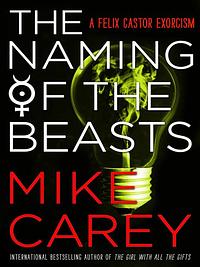Take a photo of a barcode or cover
Carey's latest yarn about Felix Castor is good fun as always, but the series was starting to feel a bit samey. Luckily, Carey seems to agree and has decided to shake things up a bit. The naming of the Beasts keeps you entertained and (for the most part) guessing, and if this is your cuppa, just sit back and enjoy.
I'm so sad to reach the end of this series! All five of these books were excellent, and I'm going to miss Felix, Pen, Juliet, Nicky (definitely the most well-preserved zombie in all literature, and the funniest, too), the Ice-Maker, and even Asmodeus, a truly frightening foe. It is now my life's work to get as many people as possible to read these books before I die.
What a great read! I was on the edge of my seat the entire time wondering how Fix was going to deal with Asmodeus, Juliet, and Jenna-Jane all at the same time. My only complaint was I would have liked the resolution to be fleshed out a little more, but otherwise a fantastic book. Can't wait for the next one!
A series that ends more with a fizzle than a bang.
A linked series gives the author the opportunity to play with theme development over time, to awaken the characters (and reader) to larger issues and complexities. Carey's fourth book [b:Thicker Than Water|2808554|Thicker Than Water (Felix Castor, #4)|Mike Carey|http://d202m5krfqbpi5.cloudfront.net/books/1328730472s/2808554.jpg|2834452] did just that by taking the issue of ghost identity and the ethics of exorcism from the third book, and raising the moral stakes with demon identity and exorcism. By linking the issue back to Felix's family, the issue hit home for both Felix and the reader. Unfortunately, The Naming of the Beasts fails to live up to the promise of issues raised the fourth book and instead goes back to Felix's beginning to untangle the mess he made attempting to exorcise Asmodeus the demon from his friend Rafi. Had I not found book four in the series to be such a fabulous read that transcended the normal UF, I might not have been so disappointed.
The story opens with Felix at a crime scene, but quickly reverts to a memory (more or less) of the drunken bender that commenced with the end of book four. We learn Felix woke up sober, decided to stay sober, and then had a heart to heart with Pen. The crime scene, of course, has Rafi/As' fingerprints all over it. Soon Felix finds himself stalked by As. When he learns that the holy order Anathemata has received permission for As to be taken 'dead or alive,' he decides to join forces withDelores Umbridge Jenna-Jane and her team of exorcists (not a bad name for a band). A lead sends him to Rafi's brother, about to be executed. Upon return, the team has him work on a haunting.
What did I like? Series completion. The ending. The resolution to the Rafi-As possession. Nicky the zombie and his decision to branch out into sales. Rosie the sex-pot ghost. The predictable but well-done rescue and escape from Jenna-Jane's house of horrors. The occasional image or turn of phrase that elevated the mundane into something special. An instance of interest: "I was already so sure it was him that I felt no surprise, just a faint sense of increased pressure weighing down on me, as though my invisible bathysphere had descended another hundred feet or so into the shit soup that now surrounded us."
Since the scope of the challenge was known (find As and exorcise him/it), the story had to content itself with a couple of small mysteries, both of which proved problematic. First were problems in ability: several times Fix failed to investigate clues (why hello, mysterious writing) and then failed discuss them with more than one person--it was so obviously going to be part of the final 'reveal' that I found myself annoyed. Second was the fact that the old Rafi seems like a huge egotist and generally so-so specimen of humanity. Even his brother on death row thinks he's an ass. Why exactly is Fix working so hard to save him? We get the guilt line and that's it. Third, Fix is given unexpected aid near the end when Jenna's head henchman has a crisis of conscience, which is about as trope-ridden an excuse as one can find for the miraculous last-minute help. Then there are hints that "something deep is afoot" and "the world is changing" that seem to go beyond the issue of a demon running amok but failed to turn into anything interesting.
In retrospect, Fix's increased drinking bothered me even more. Not only that he did it, but that he was able to get himself "dry" by willpower and going cold-turkey. As someone who has cared for detoxing people, I can safely say withdrawing from alcohol can be a medical emergency and can take days (as in 2 to 3) to start to get to the worst of it. It's the kind of detail that says, "meh. I don't need to research. I just need to knock this book off."
I was also bothered by the failure of Carey to follow-up on the promising philosophical discussions raised in the fourth book. Although Fix has a couple of almost-conversations about it with another necromancer, Trudi, he doesn't actually spell it out or argue with details--when they exorcise ghosts, in one sense they are killing a spirit. A conversation with some zombies starts to touch on the issue as well. I think by now I know where Fix stands, so it's strange that he wouldn't start talking the new gospel with others in his profession.
There's some weird domestic violence stuff as well that is supposed to show personality change in Juliet, but mostly just seems like a crutch and serves to make the reader uncomfortable. Carey does better when he emphasizes how she is losing her humanity through lack of empathy and a temptation to swallow Fix whole.
All in all, I'd have to say it just wasn't as tightly woven as the fourth, [b:Thicker Than Water|2808554|Thicker Than Water (Felix Castor, #4)|Mike Carey|http://d202m5krfqbpi5.cloudfront.net/books/1328730472s/2808554.jpg|2834452].
Review for Thicker: http://www.goodreads.com/review/show/169826728
Cross posted at http://clsiewert.wordpress.com/2013/07/24/the-naming-of-the-beasts-by-mike-carey/
A linked series gives the author the opportunity to play with theme development over time, to awaken the characters (and reader) to larger issues and complexities. Carey's fourth book [b:Thicker Than Water|2808554|Thicker Than Water (Felix Castor, #4)|Mike Carey|http://d202m5krfqbpi5.cloudfront.net/books/1328730472s/2808554.jpg|2834452] did just that by taking the issue of ghost identity and the ethics of exorcism from the third book, and raising the moral stakes with demon identity and exorcism. By linking the issue back to Felix's family, the issue hit home for both Felix and the reader. Unfortunately, The Naming of the Beasts fails to live up to the promise of issues raised the fourth book and instead goes back to Felix's beginning to untangle the mess he made attempting to exorcise Asmodeus the demon from his friend Rafi. Had I not found book four in the series to be such a fabulous read that transcended the normal UF, I might not have been so disappointed.
The story opens with Felix at a crime scene, but quickly reverts to a memory (more or less) of the drunken bender that commenced with the end of book four. We learn Felix woke up sober, decided to stay sober, and then had a heart to heart with Pen. The crime scene, of course, has Rafi/As' fingerprints all over it. Soon Felix finds himself stalked by As. When he learns that the holy order Anathemata has received permission for As to be taken 'dead or alive,' he decides to join forces with
What did I like? Series completion. The ending. The resolution to the Rafi-As possession. Nicky the zombie and his decision to branch out into sales. Rosie the sex-pot ghost. The predictable but well-done rescue and escape from Jenna-Jane's house of horrors. The occasional image or turn of phrase that elevated the mundane into something special. An instance of interest: "I was already so sure it was him that I felt no surprise, just a faint sense of increased pressure weighing down on me, as though my invisible bathysphere had descended another hundred feet or so into the shit soup that now surrounded us."
Since the scope of the challenge was known (find As and exorcise him/it), the story had to content itself with a couple of small mysteries, both of which proved problematic. First were problems in ability: several times Fix failed to investigate clues (why hello, mysterious writing) and then failed discuss them with more than one person--it was so obviously going to be part of the final 'reveal' that I found myself annoyed. Second was the fact that the old Rafi seems like a huge egotist and generally so-so specimen of humanity. Even his brother on death row thinks he's an ass. Why exactly is Fix working so hard to save him? We get the guilt line and that's it. Third, Fix is given unexpected aid near the end when Jenna's head henchman has a crisis of conscience, which is about as trope-ridden an excuse as one can find for the miraculous last-minute help. Then there are hints that "something deep is afoot" and "the world is changing" that seem to go beyond the issue of a demon running amok but failed to turn into anything interesting.
In retrospect, Fix's increased drinking bothered me even more. Not only that he did it, but that he was able to get himself "dry" by willpower and going cold-turkey. As someone who has cared for detoxing people, I can safely say withdrawing from alcohol can be a medical emergency and can take days (as in 2 to 3) to start to get to the worst of it. It's the kind of detail that says, "meh. I don't need to research. I just need to knock this book off."
I was also bothered by the failure of Carey to follow-up on the promising philosophical discussions raised in the fourth book. Although Fix has a couple of almost-conversations about it with another necromancer, Trudi, he doesn't actually spell it out or argue with details--when they exorcise ghosts, in one sense they are killing a spirit. A conversation with some zombies starts to touch on the issue as well. I think by now I know where Fix stands, so it's strange that he wouldn't start talking the new gospel with others in his profession.
There's some weird domestic violence stuff as well that is supposed to show personality change in Juliet, but mostly just seems like a crutch and serves to make the reader uncomfortable. Carey does better when he emphasizes how she is losing her humanity through lack of empathy and a temptation to swallow Fix whole.
All in all, I'd have to say it just wasn't as tightly woven as the fourth, [b:Thicker Than Water|2808554|Thicker Than Water (Felix Castor, #4)|Mike Carey|http://d202m5krfqbpi5.cloudfront.net/books/1328730472s/2808554.jpg|2834452].
Review for Thicker: http://www.goodreads.com/review/show/169826728
Cross posted at http://clsiewert.wordpress.com/2013/07/24/the-naming-of-the-beasts-by-mike-carey/
I'll admit to being sick unto death of Rafi and rather hoping that he would disappear for the whole book. That was not to be.
3.5 stars is more apt. Things kind of got ramped up into near parody at times.
3.5 stars is more apt. Things kind of got ramped up into near parody at times.
The series has been building to this book and it's been totally worth it. Each book in the series was a page turner and dealt out precious new info about the supernatural world of freelance exorcist Felix Castor. But the thread that's been a subplot in each of the previous installments finally takes the foreground for an entire book and makes you realize Carey has been playing the long game all along. In the process he's built a fantastic crew of supporting characters, and the stakes for this surprisingly wily band of spiritual warriors could not be higher. Hard to believe there's another book planned after this one.
Carey's latest yarn about Felix Castor is good fun as always, but the series was starting to feel a bit samey. Luckily, Carey seems to agree and has decided to shake things up a bit. The naming of the Beasts keeps you entertained and (for the most part) guessing, and if this is your cuppa, just sit back and enjoy.
I'm glad this finally tied up the Rafi plotline, which though intense, was starting to drag a little for me. What happens to Juliet in this book is sad - and it really made me pause about her relationship with Susan and how to feel about what happens, even if she wasn't in her right mind at the time. I also thought the bit about the pool was so f'ing creepy and so atmospherically brought to life in writing - I almost lost my breath that first time Felix and Trudie encounter it.




